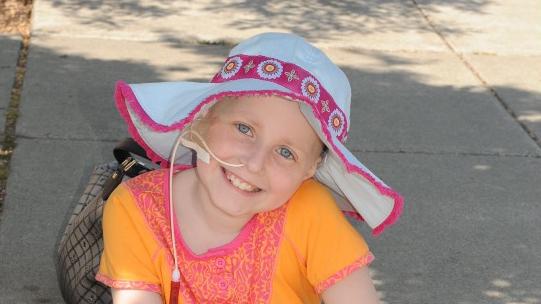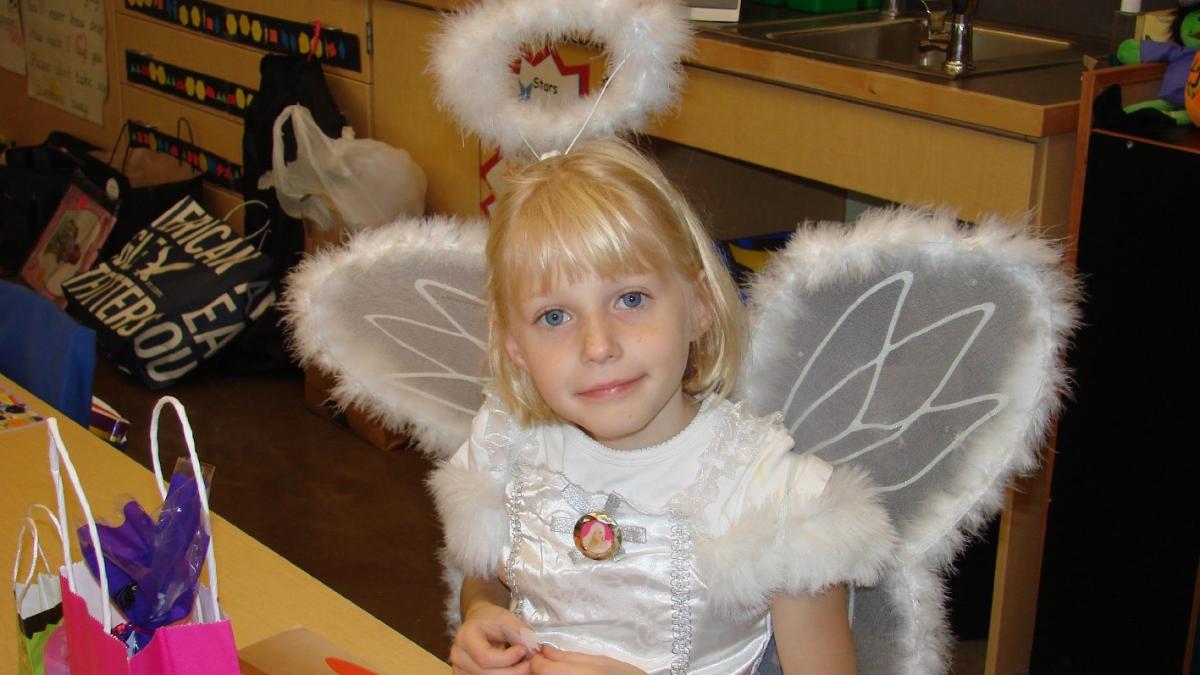Too many parents lose their children to blood cancer each year. It’s a devastating experience for families blindsided by the harsh realities of cancer treatment that wasn’t developed with their little ones in mind.
These lives lost too soon are the reason parents of children touched by blood cancer advocate fervently for change. And it’s a cause their communities and loved ones are more than happy to join—developing better treatment options that are safer and more effective for children, causing fewer side effects and leading to better outcomes.
Susan Callahan knows all too well what this experience is like. Her community showed up for her and her family when her daughter, Maddy, was diagnosed with blood cancer.
And they have continued to show up each and every day since.
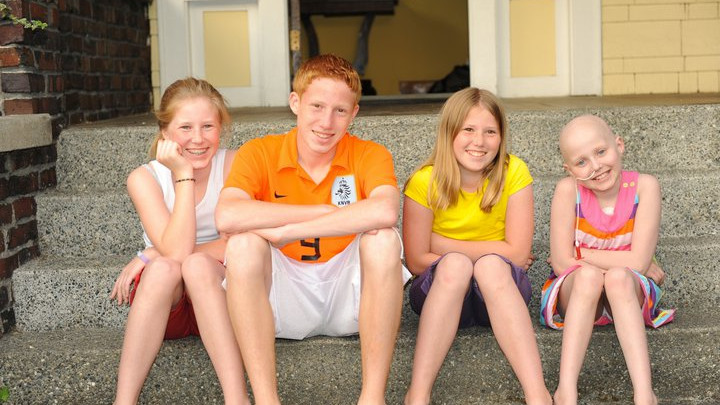
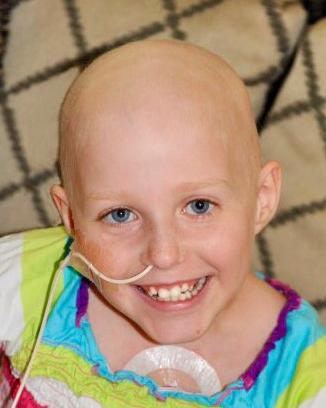
Maddy’s initial diagnosis
It was November 2008, almost Thanksgiving. Maddy had just turned seven and life was good. Maddy made sure to keep things interesting!
“She was the baby. Very spunky. Very spoiled. Funny, funny, funny. She didn’t like to be the center of attention… but she did,” Susan reminisced, smiling. “Maddy was my kind, wild child!”
When Susan took Maddy to her seven-year well check, her pediatrician noted that she looked pale. Susan didn’t think much of it because it was the middle of November and her whole family looked pale—summertime was long gone, so they weren’t spending as much time outside in the sun.
But her doctor thought something was off, so she ordered several labs.
That night, Susan, Maddy, and their whole family’s lives spun out. The pediatrician called to tell Susan that the baby of their family—the youngest of four—had acute myeloid leukemia (AML) and they needed to rush to Seattle Children’s for emergency treatment.
They expected to be at the hospital for at least a week but ended up spending 297 days there over the next year. Luckily, Maddy and her family were surrounded and uplifted by countless loved ones throughout it all.
Family, friends, and colleagues stepped up to the plate when Maddy needed them most
After Maddy’s diagnosis, the Callahans’ village surrounded and uplifted them. That support made a huge difference as they made sure Maddy was getting the best treatment possible for her AML.
A short while before Maddy’s diagnosis, Susan was working for a company that developed cancer therapies. The CEO of the company worked with E. Donnall Thomas, Nobel Prize winner for his pioneering work on bone marrow transplantation to treat acute leukemia.
“I met Dr. Thomas,” Susan shared. “There was an event where Jose Carreras, [the third person to receive a successful bone marrow transplant], came into town for the 15-year anniversary of his transplant, so I was able to meet them both.”
Five years later, Maddy was diagnosed with AML and needed a bone marrow transplant. And thanks to the work of E. Donnall Thomas, she was able to receive not one transplant, but two.
In April 2009, Maddy received her first bone marrow transplant from her older brother, Jack. He was only 14 years old at the time, but he was proud to do his part to save his sister’s life.
“Jack was a perfect match [for the transplant] and he proved what a brave, amazing kid he was by donating his bone marrow,” Susan recalls.
Unfortunately, the transplant didn’t work. Maddy’s cancer relapsed after three months. Since it was so aggressive, she enrolled in clinical trials in hopes of reaching remission so she could have another transplant.
Susan appreciates that her family had access to clinical trails and some of the best healthcare services in the world—but she knows other families aren’t as lucky and wants to change that.
“It shouldn't matter what your zip code is. Everybody, every parent should feel confident that they're getting the latest medical treatments, benefiting from clinical trials."
Learn more about how LLS is working to improve access to clinical trials.
One of the clinical trials Maddy participated in was studying the use of a drug called serafanib for pediatric AML treatment. But serafanib was a pill and Maddy was only 7. “She didn’t know how to swallow pills. We practiced over and over with Tic Tacs, but she couldn’t do it,” Susan recalled. “So, when the care team was rounding, I broke into tears because I thought she wouldn’t be able to take this medicine and we’d be out of options.”
The care team told Susan not to worry and got to work figuring out a solution with the pharmacist. They ended up crushing the serafanib in cherry syrup, which was the first time that had ever been done for that particular medicine.
Then, they waited to see if the medicine would work.
And it did!
“I’m proud to say that serafanib is now the standard of care for patients with FLT3 AML,” Susan shares, “and Maddy was one of the first pediatric patients to have it. She went into remission and was able to get her second transplant in October 2009.”
Unfortunately, the second transplant didn’t take either. Maddy passed away on November 30, 2009, just one year and 12 days after that initial well check visit.
Susan and her family miss Maddy every single day. Healing from her loss has been a long road, but their village has moved in lockstep to support them—even to this day.
Honoring Maddy’s legacy
While Maddy was receiving treatment for AML, Susan’s best friends from high school, Ally and Scott, were in the process of launching MOD Pizza. “They had just opened their first store in Seattle,” Susan explained. “Maddy loved cheese pizza, so when they expanded the menu, they named it after her.”
But the MOD founders were just getting started in honoring Maddy’s legacy. After she passed, they hung a beautiful black and white portrait of Maddy in every MOD Pizza location.
“I'm a horrible photographer—I'm terrible,” Susan laughed, “but I actually took that picture.”
This has contributed to Susan and her family’s healing over the years—especially her father (Maddy’s grandfather), who lived a distance away until recently moving in with Susan and her family. Whenever he misses Maddy, he goes to MOD Pizza and eats near Maddy’s picture.
And in general, food has been at the center of their family’s healing process.
She explains: “MOD Pizza represents the ultimate ‘comfort food’ and way to foster togetherness—even in crazy times. Our family and friends became super tight as we leaned on each other through Maddy’s illness and the aftermath, and it was often through the simple act of sharing a meal together. It creates a space for conversation, laughter, sharing memories and quality time. MOD does this every day.”
MOD Pizza recently changed ownership, but they remain steadfast in their commitment to honoring Maddy and the communities that support their restaurants, due in large part to their Vice President of Marketing, Lyndsey Patel.
Lyndsey Patel, Vice President of Restaurant Marketing, joined MOD Pizza this year and was blown away by Maddy’s story. She knew she had to do her part to amplify it through their menu refresh this fall, and she knew the perfect way to do it.
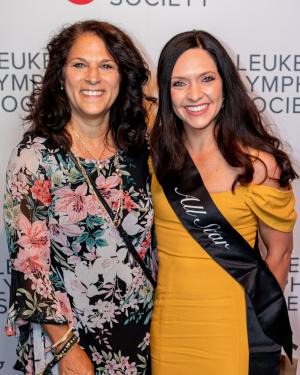
Pizza with a purpose
At MOD, Pizza is Personal, and they find authentic ways to connect their people to purpose.
Back in 2011, Lyndsey was an intern at the Leukemia & Lymphoma Society (LLS), supporting the Visionaries of the Year campaign (formerly Man and Woman of the Year). After that experience, she felt moved to give back and support the blood cancer community in other ways.
“I supported as a volunteer and fundraised in different ways over the years,” Lyndsey shared. “And then I ran for Woman of the Year myself in 2022 and again as an All-Star in the Visionaries campaign just this year.”
“As I was onboarding with MOD, I asked about ‘The Maddy’ and how our cheese pizza got its name. I was told the story by a longtime MOD squad member, but many other people couldn’t tell me the same story about her consistently,” Lyndsey remembers. “I reached out to Susan directly to make sure I knew the story as she would tell it.”
And what happened next came naturally to Lyndsey. She made introductions so that LLS could partner and share Maddy’s story with the world while reinforcing MOD Pizza’s purpose: supporting communities and making impact.
“It came full circle for me to connect the fundraising in Maddy’s memory to LLS, because I knew just how impactful the organization is for many other children like Maddy and their families,” Lyndsey says.
So, as they relaunched the menu in the fall, “The Maddy” remained. They are fundraising in her honor for the entire month of October 2024 and further incentivizing families to dine out and make an impact together through “kids eat free” events each Sunday in October.
Susan, Lyndsey, and the entire MOD Squad are thrilled this partnership is underway to support LLS and The Dare to Dream Project, helping to fund better, safer treatments for kids just like Maddy.
"It warms my heart that people may benefit from Maddy's story," says Susan.
